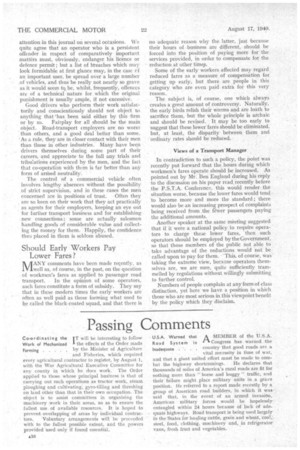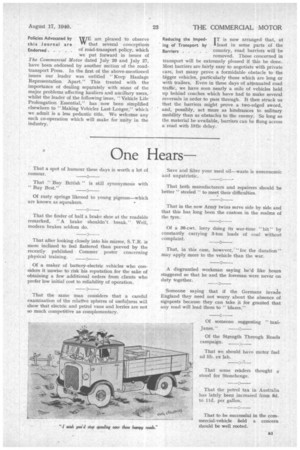• Passing Comments
Page 18

Page 19

If you've noticed an error in this article please click here to report it so we can fix it.
Co-ordinating the IT will be interesting to follow Work of Mechanized the effects of the Order made Farming by the Minister of Agriculture
and Fisheries, which required every agricultural contractor to register, by August I, with the War Agricultural Executive Committee for any county in which he does work. The Order applied to those whose principal business is that of carrying out such operations as tractor work, steam ploughing and cultivating, gyro-tilling and threshing on land other than that in their own occupation. The object is to assist committees in organizing the machinery work in their areas, so as to ensure the fullest use of available resources. It is hoped to prevent overlapping of areas by individual contrac tors. Voluntary arrangements will be proceeded with to the fullest possible extent, and the powers provided used only if found essential.
A MEMBER of the U.S.A.
Congress has warned the country that good roads are a vital necessity in time of war, and that a giant united effort must be made to com
bat the highway shortcomings. He declares that thousands of miles of America's rural roads are fit for nothing more than "horse and buggy" traffic, and their failure might place military units in a grave position. He referred to a report made recently by a group of American road builders, in which it was said that, in the event of an armed invasitm, American military forces would be hopelessly entangled within 24 hours because of Jack of adequate highways. Road transport is being used largely in the States for hauling cattle, grain and wheat, coal, steel, food, clothing, machinery and, in refrigerator vans, fresh fruit and vegetables.
U.S.A. Warned that Road System is Inadequate .
Policies Advocated by I'VE are pleased to observe this Journal are wir that several conceptions Endorsed of road-transport policy, which we put forward in issues of The Commercial Motor dated July 20 and July 27, have been endorsed by another section of the roadtransport Press. In the first of the above-mentioned issues our leader was entitled "Keep Haulage Representation Apart." This treated with the importance of dealing separately with some of the major problems affecting hauliers and ancillary users, whilst the leader of the following issue, "Vehicle Life Prolongation Essential," has 'now been simplified elsewhere to "Making Vehicles Last Longer," which we admit is a less pedantic title. We welcoine any such co-operation which will make for unity in the industry.
Reducing the ImpedIT is now arranged that, at ing Of Transport by 'least in some parts of the
Barriers country, road barriers will be removed. Those concerned in transport will be extremely pleased if this be done. Most barriers are fairly easy to negotiate with private cars, but many prove a formidable obstacle to the bigger vehicles, particularly those which are long or with trailers. Even in these days of attenuated road traffic, we have seen nearly a mile of vehicles held up behind coaches which have had to make several reversals in order to pass through. It then struck us that the barriers might prove a two-edged sword, and, possibly, act more as hindrances to military mobility than as obstacles to the enemy. So long as the material be available, barriers can be flung across a road with little delay.




























































